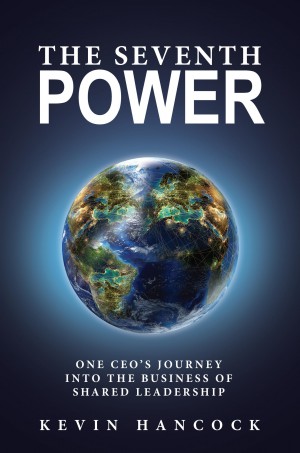True Profitability and Productivity Come From Striving for a Bigger Social Goal

In 2012, Hancock Lumber CEO Kevin Hancock was diagnosed with spasmodic dysphonia, a rare neurological speaking disorder that made communicating difficult.
While Hancock initially considered the partial loss of his voice a hindrance, he eventually learned to see it as a possible gift, an invitation to lead differently and strengthen the voices of others.
Hancock traveled the world to test, refine, and validate one formative idea: Organizations are most effective when the opportunity and responsibility for leading is shared broadly and embraced by all. The following is an excerpt from his new book,The Seventh Power: One CEO’s Journey Into the Business of Shared Leadership .
***
A week after my visit to Boston, I’m standing on the concrete floor inside our Casco, Maine, mill. The entire crew is either sitting on blue wooden benches in front of me or standing near the yellow safety rails that surround the perimeter of the manufacturing line. Red hard hats with the Hancock Lumber logo are everywhere.
Apart from the sound of my own voice, this long, wood-framed building is unusually quiet. Normally, at this hour, you would hear the high-pitched tone of the planer and the rattling churn of the wood-waste chipper in the background. Here, everyone is typically in motion.
But right now, the entire team is still and thinking. It’s the end of our quarterly huddle, and much of the talk has concerned safety initiatives, quality control, productivity, and performance. Now it’s my turn to share a few words, and today I’m after something even more important: human engagement and the value of meaningful work.
“We work for financial reasons, but we also work to belong to something larger than ourselves,” I say to the group. “A company needs to be a place where people feel valued and heard. It’s not enough just to be profitable or earn a paycheck. Work needs to also add non-financial value to people’s lives. We want this company to be a place where everybody leads and can feel their own worth and value. Thank you for answering that call and taking so much pride in what you do.”
After my short talk, I lean on the rail and listen to the next person speak. Safety awards are being given out. The facility has gone more than a year without a single work restriction from injury, and we were recently certified by OSHA’s Safety and Health Achievement Recognition Program (SHARP), its highest national safety award for manufacturers. Safety results at that level can only be achieved when each person on the team is a leader.
Unemployment in Maine is currently at a 40-year low. Many companies, both locally and nationally, are struggling to fully staff their organizations, but we aren’t. Of the 525 positions at Hancock Lumber, only two are currently open.
What created this situation?

I have listened to lots of executives talk about aging demographic trends, low unemployment rates, and the difficulty of hiring enough people to do the work of the company. For me, that’s an external view of an internal problem. Maine has hundreds of thousands of people who work. At Hancock Lumber, we only have room for a tiny fraction of the state’s working population on our team. In any economic cycle, the key is to focus on the micro environment inside our company, not the macroeconomic conditions beyond our reach or control. Small is the new big.
At Hancock Lumber, we grow trees, but that is not our core objective. We make lumber, but that is not our primary purpose. We manage logistics, but that is not our most important task. Our one big goal is to add value to the lives of the people who work at Hancock Lumber. Work should add more than just economic value to the lives of the people who operate our company.
There is a quote that lives at the bottom of every email I send. It’s from British author and marketing consultant Simon Sinek, and it reads, “Customers will never love a company until employees the employees love it first.”
An organization’s true value is not defined by its revenue growth or profitability. While those are important metrics for our business, they are the outcomes of pursuing a higher purpose. Our mission is to add value to people’s lives. Profitability, productivity growth, and exceptionally high levels of customer satisfaction are important, but they are outcomes of striving for a bigger social goal.
Where in the modern world can adults grow? Lots of places, I suppose, but work can become the leading venue. In America, there are 160 million people who work. Globally, there are 2 billion workers. The average full-time worker in America devotes 48 hours a week to their job. Careers last for decades. The time and energy humans invest in work cannot be just an economic proposition. As traditional institutions like centralized governments struggle around the globe for effectiveness, work can become the new incubator of societal change and human progress.
Self-worth is the fuel that can change the world. Work can be a place where everyone can see their value, find their voice, and grow. But for this to happen, business leaders must learn to think differently about their roles, and the very mission of a corporation must evolve.
Excerpted fromThe Seventh Power: One CEO’s Journey Into the Business of Shared Leadershipby Kevin Hancock. Used with permission of Post Hill Press.
Kevin Hancock is the CEO of Hancock Lumber Company, a recipient of the Ed Muskie Access to Justice award, the Habitat for Humanity Spirit of Humanity award, the Boy Scouts of America Distinguished Citizen award, and theTimber Processing MagazinePerson of the Year award.

